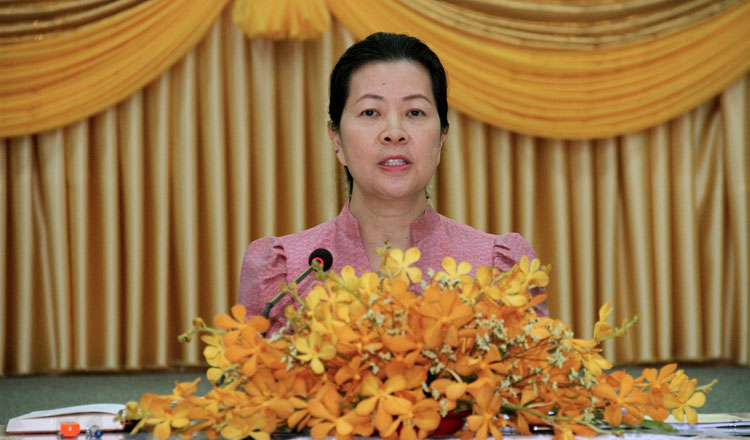Go4eCam expected to launch in July
 Secretary of State at the Ministry of Commerce Tekreth Kamrang said promoting the digital economy is a priority for Cambodia. Supplied
Secretary of State at the Ministry of Commerce Tekreth Kamrang said promoting the digital economy is a priority for Cambodia. Supplied
The Ministry of Commerce’s Go4eCam e-commerce marketplace is expected to go online in July, according to Long Kemvichet, the deputy director general at the ministry’s General Department of International Trade.
He made the remarks at an Aid for Trade Stocktaking webinar attended by the commerce ministry and representatives from the private sector, international organisations and development partners.
The e-commerce platform will aim to increase economic opportunities for small and medium enterprises (SMEs) in Cambodia and help them to participate in the digital economy.
It will focus on digitising micro, small and medium enterprises (MSMEs) and supporting SMEs that operate in the provinces and those owned by women.
Another main priority will be developing and growing the business-to-business (B2B) marketplace that, according to international trade adviser to the commerce ministry, Sven Callebaut, has yet to gain a foothold in Cambodia.
Ministry of Commerce (Moc) Secretary of State Takreth Kamrang said that the digital economy and e-commerce represent new sources of growth in Cambodia.
“The Royal Government of Cambodia is currently finalising business policy frameworks for transforming Cambodia into a digital economy and digital society by 2035,” she said.
E-commerce is still in its infancy in the Kingdom, but it’s gaining popularity and more Cambodians aged 15 or older have mobile money accounts (5.7 percent) than credit cards (0.6 percent), according to a We Are Social survey presented at the webinar.
Kemvichet said the marketplace will cater to both international and local clients and will be promoted at both local exhibitions and international expos.
The e-commerce platform will feature product listings, order systems, payment systems and shipping services, along with integrated services including payment service providers and logistics providers.
It will also aim to develop soft skills in the sector as Cambodia transitions to a more digital society.
In the absence of an established e-commerce marketplace, private businesses have adapted their own models and there are about 40 e-commerce businesses in the market.
Almost all are business-to-consumer companies (B2C) which cater to domestic needs, such as food delivery and ride-hailing companies.
When asked if the e-commerce system would replace e-commerce platforms already created by the private sector, Kemvicchet said that wouldn’t be the case.
“We are focusing on B2B rather than B2C, which has been done before in Cambodia. The B2C platforms that were launched in previous years, they come and go. We haven’t seen a lot of sustainability in that respect,” he said.
Kemvichet said the focus will be on promoting cross-border and cross-provincial trade and the platform will be able to be used as a model to be duplicated and scaled up by the private sector.
Chea Ratha, founder and chief executive officer of Khmum Technology – a startup which offers a proprietary marketplace to connect sellers and consumers – said she hopes to collaborate with the ministry’s efforts to improve the sector.
She said she’s wary of spending money and time on bringing onboard customers already enrolled on other platforms to a new one. Combining platforms, she said, could be better and leave more money and time to be spent on marketing products.
Ratha added that the private sector has experience in the sector, whereas the ministry is starting from scratch and that a partnership between the two would be ideal.
“I hope that we can have synergy. We’ve been working on this for the past two to three years, so we have a lot of experience. For the MoC. It’s brand new to them.”
According to a Profitence (Cambodia) Co Ltd report, e-commerce market revenue in Cambodia totalled $359 million in 2020 and is projected to reach $537 million by 2024.
In a survey of current e-commerce companies in Cambodia carried out by Khmum Technology, 50 percent of companies said that lowering advertisement spending because of COVID-19 was the biggest factor in their sales declining. Fifty percent of the businesses said they had suffered a moderate impact, while 25 percent said they had not been affected by the pandemic.
When asked which areas needed the most support, 62.5 percent said access to finance, while 37.5 per cent cited regulation and policy support.
Nick Beresford, the UN Development Programme’s resident representative in Cambodia, said trade has been an important factor in reducing poverty levels in Cambodia and that compared with other less-developed-countries (LDCs) in the region, Cambodia relied more heavily on trade to spur its economy. But COVID-19 has disrupted this sector, which is why the UNDP wants to assist the MoC in developing the e-commerce platform, Beresford said. Khmer Times






